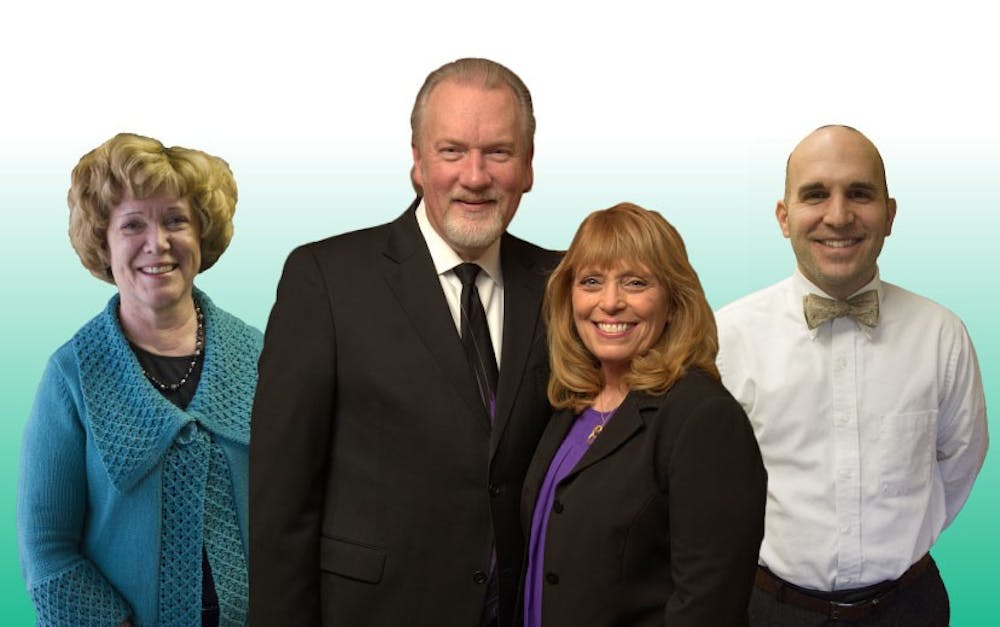By Chris Yingling & Becca Robb | The Echo

The search is finally over.
After months of exhaustive research, painstaking interviews and meticulous resume perusals, the Taylor Board of Trustees has announced that P. Lowell Haines will be taking over as president-elect of the university.
Haines replaces current president Eugene Habecker, who announced his retirement last May. Haines will begin his presidency on June 1, 2016.
The university is a second home for Haines, a 1975 Taylor graduate. He spent his first 10 professional years at Taylor, serving as residence hall director (1977-1980), director of student programs (1980-83), dean of students (1983-85) and vice president for student development (1985-97).
After leaving his role as vice president for student development, Haines moved on to Faegre Baker Daniels, a large law firm in Indianapolis, for 25 years. For 17 of those years, he served as a partner. He worked with non-profit companies and also served as a legal representative for several colleges and universities. In his time with Faegre Baker Daniels, Haines assisted in tax exemptions for churches and faith-based organizations, along with other non-profit businesses.
While at Faegre Baker Daniels, Haines has served on the Taylor Board of Trustees since 2002.
Haines's wife, Sherry, is a 1976 Taylor graduate and has spent the past 35 years as an art teacher. Most recently, she taught at Cathedral High School in Indianapolis.
"It is a wonderful privilege to return to Taylor University," Haines said. "Sherry and I met on this campus, spent the early years of our marriage here, and were grateful when our daughter decided to attend Taylor . . . . We are deeply grateful to the Board of Trustees for the trust they have placed in us and are looking forward to getting to work in the days to come."
The search process was not an easy one. As reported by board member Mark Taylor, Haines was selected from a group of 176 prospects. Those prospects were narrowed down to 47 formal applications. After evaluation, the board, with assistance from executive search firm Carter Baldwin, narrowed the field to 10 candidates, including two women and one person of color. After a few more interviews, they further narrowed it down to five finalists.
On Dec. 5, the board accepted the nomination of Haines. Before formally offering him the position, however, they did extensive questioning and background checks on their selected candidate.
"As a board, we sought a candidate who combined exemplary experience in higher education and a belief in the mission of Taylor University with a strong desire to impact the next generation of student leaders," said Wellington Chiu, Taylor's chairman of the board. "Working with Lowell on the board has given all of us the opportunity to recognize his gifts and passion. We believe he not only will be able to lead Taylor University in an exceptional way, but he will also provide an important link and continuity to the outstanding accomplishments of Dr. Habecker."
President Habecker and Marylou will continue as president and first lady until the end of the academic year. The change is a big move for Taylor; many students seem excited.
"He seems like a really down-to-earth guy," said freshman Bryson Shelor. "He seems like a positive influence. As a graduate of Taylor, he knows what's going on around here. He seems personable and approachable."
More details about Haines's hiring can be found on taylor.edu.
Sherri Harter is the Interim Vice President of Advancement at Taylor, succeeding Ben Sells, who resigned his position to become vice president of Avis Industrial Corporation.
Harter worked at the former Ft. Wayne campus for a number of years, then moved to the Upland campus in 2008 as executive director of development. She worked with Sells for several years, which gave her a broad perspective on advancement and how it impacts the University.
"I believe in Christian higher education and I believe in making this experience at Taylor affordable for these students who want to come here," Harter said. "I'm here for the students, and what I do directly impacts the students."
Previously, she has raised funds for buildings, scholarships and other special projects. Her previous project was campaigning for the LaRita Student Center.
She said her position is interim because of the upcoming presidential transition. As Lowell Haines enters into his new position as president of Taylor, Harter anticipates he will share his input and search for a more permanent vice president of advancement.
Harter affirmed the advancement staff's work and accomplishments and said she doesn't anticipate making any drastic changes to the advancement program.
"I've had a long career in the area of advancement, and it's just neat how the Lord gives opportunities through the years and through growth that prepares you for the next step," Harter said. "My first position was staff writer . . . (and) each added responsibility and each new position has prepared me for where I'm at."
Andrew Draper succeeded Scott Moeschberger as director of the Honors Guild on Feb. 1. Scott Moeschberger now directs Taylor's Orphans and Vulnerable Children program.
Draper is a visiting assistant professor of theology in the Bible department and plans to continue teaching as he assumes his new position as Honors Guild director.
He earned his PhD in theological ethics from the University of Aberdeen in Scotland. That, alongside his experience as an assistant professor, has prepared him to take on a role with more diverse responsibilities.
"I found that (the new position) dovetailed with my interests perfectly," Draper said. "I enjoy taking an interdisciplinary focus, so students aren't just stuck in one disciplinary silo, but they can think about ethical issues and social issues and how those relate to their Christian commitments."
Draper said he is looking forward to designing Honors courses that engage multiple subjects on deeper levels and combine contemporary issues with real life situations. He hopes to help students consider their own theology and how they live out that theology.
The Honors minor requires 18 hours, and Draper's role involves recruiting professors and organizing curriculum for each of the classes.
Draper commended the Honors Guild Advisory Council and Scott and Jennifer Moeschberger for the foundation they've laid for the program.
"I and the Honors Advisory Council have some new ideas about where we could take things, but we don't want to dramatically change something that's working well," Draper said.




